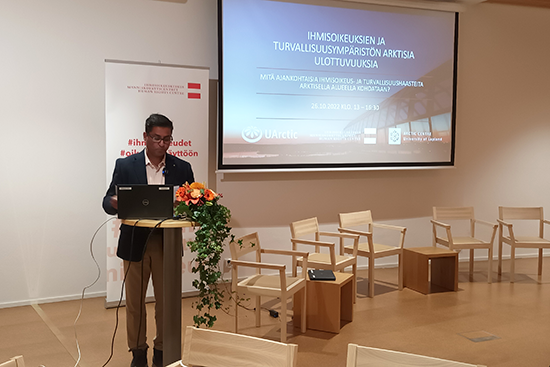Human Rights Centre, Arctic Centre at the University of Lapland, the Northern Institute for Environmental and Minority Law and The University of the Arctic (UArctic) network organized a seminar on 26th of October where human rights and the changed security environment were discussed, especially from the point of view of the Arctic region.
Moderator of the event, visiting senior researcher from the Arctic Centre, Leena Heinämäki opened the event by stating that many issues related to climate change are human rights issues. Many of these issues are standing out in the Arctic area due to faster warming of the region compared to other parts of the world. In addition, the military aggression started by Russia has direct effects on human rights, such as freedom of speech.
In her opening words Leena Leikas from Human Rights Centre brought up the importance of cooperation between the Human Rights Centre and academic institutions in order to provide research-based information for the decision-making.
In his speech research professor Timo Koivurova presented the results of a report commissioned by the Finnish Government regarding the changed cooperation and security environment in the Arctic region.
– As a result of Russian aggression, the co-operation in the Arctic is under a threat or already completely ended. The co-operation would be though necessary in order to be able to take the important climate actions in the global level.
Head of the Science Communication Markku Heikkilä from Arctic Centre talked about the long history of the Finnish arctic politics from perspective of human rights and the Russian aggression. According to him, the long-term effects of the war on Arctic cooperation are yet unknown.
Researcher professor Kamrul Hossain focused in his speech on the human security in the Arctic.
– The point of human security is to put security on the level of individuals and communities, for example the security of food production. There are already huge changes in these topics in the Arctic areas because of the climate change.
Mirva Salminen is working as an assistant professor in societal security at the Arctic University of Norway in Tromsø. She is specialised in digitalization and cyber security issues.
– The implementation of digital rights is, on the one hand, about how the listed rights are implemented for each individual in the digital environment, and on the other hand, how the implementation of basic and human rights in cyber-physical everyday life depends on the functionality of the digital environment. In the Arctic regions, neither angle of entry has yet received sufficient attention.
According to research professor Stefan Kirchner, climate justice is sought more and more often through human rights, because climate change has real effects on, for example, people's economy or the practice of culture.
The last speech of the seminar was given by the chair of the Youth Council of the Saami Parliament Anni-Sofia Niittyvuopio.
– Although the participation of the Sámi in the decisions making concerning themselves has increased there are still lot of things to improve, Niittyvuopio said.
The panel discussion summarized the ideas of earlier speeches and it also discussed more about, among other things, the various effects of climate change on the realization of human security and the utilization of the traditional knowledge of the Sámi people, especially in environmental decision-making.
Further information:
Human Rights Centre: www.ihmisoikeuskeskus.fi

Research Professor Kamrul Hossain talking about Human Security.